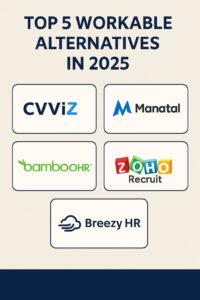
Recruitment software is to organize your recruitment process. Every organization has a different way of handling recruitment. Your decision about buying recruitment software will depend on multiple factors. Factors such as the nature of your business, size of your organization, geographic presence, etc. e.g. if you are a startup or a small to midsize business you will need recruitment software for internal hiring.
There are tons of recruitment software out there. And It could be hard to narrow down to few. Hence, here are 3 tips to help you make a decision.
1. On-Premise Vs On Cloud Based Recruitment Software
Cloud based recruitment software system has become more popular in recent years especially with small-midsize businesses. But there can be few reasons like GDPR, why a firm might choose a traditional on-premise recruitment software solution.
A cloud based recruitment software is hosted on a vendor’s (AWS, Azure) premises and accessed through a web browser. It is also called as online recruitment software. On-premise software is hosted locally, on the company’s servers.
While there could be many differences between the two solutions, the key differentiator between the two solutions is their pricing models. Cloud-based recruitment software solutions are under a monthly or annual subscription (SaaS) basis whereas on-premise recruitment solution charges a one-time perpetual license fee.
Both solutions are robust in terms of providing data and cybersecurity.
The low entry cost of a cloud based recruitment software compared to a very expensive on-premise recruitment solution is a primary reason for its popularity. Also, cloud based recruitment software is always accessible and hence also known as online recruitment software.
2. Integration with other Software
It is highly unlikely that one software will provide the best of everything. e.g. An applicant tracking system may not be the best CRM too. OR recruitment software may not provide call automation features.
There are tools or softwares that excel in particular services. e.g. There are softwares that are specialized in resume screening using AI. Similarly, there are softwares that are focused on certain services.
What you need is a recruitment software that can integrate with other softwares using open APIs. You should be able to use new upcoming tools and technologies without giving up on existing software.
3. Recruitment Analytics
Recruiting is undergoing a significant shift. It is becoming more data-driven than intuition driven.
In order to understand if buying a recruitment software has improved the productivity of your recruitment team, you should be able to measure important aspects of recruitment. In recruiting we often measure time to fill to measure efficiency. We also measure cost per hire, cost per applicant, candidate applicant to candidate shortlisting ratio to measure the effectiveness of your sourcing channel. e.g. you should be able to tell which recruitment vendor is sourcing the best candidates for you. Similarly, you should be able to figure which digital platform is working for you.
Your software should be able to provide such metrics to help you benchmark your performance against industry performance.
Summary
Even though there are many software solutions for recruiting there can not be one software that will suit every kind of organization. However, the above 3 key points can help you in narrowing down to a few from the pile of recruitment softwares. Modern recruiting software provides these features to accommodate most of your recruiting needs.




